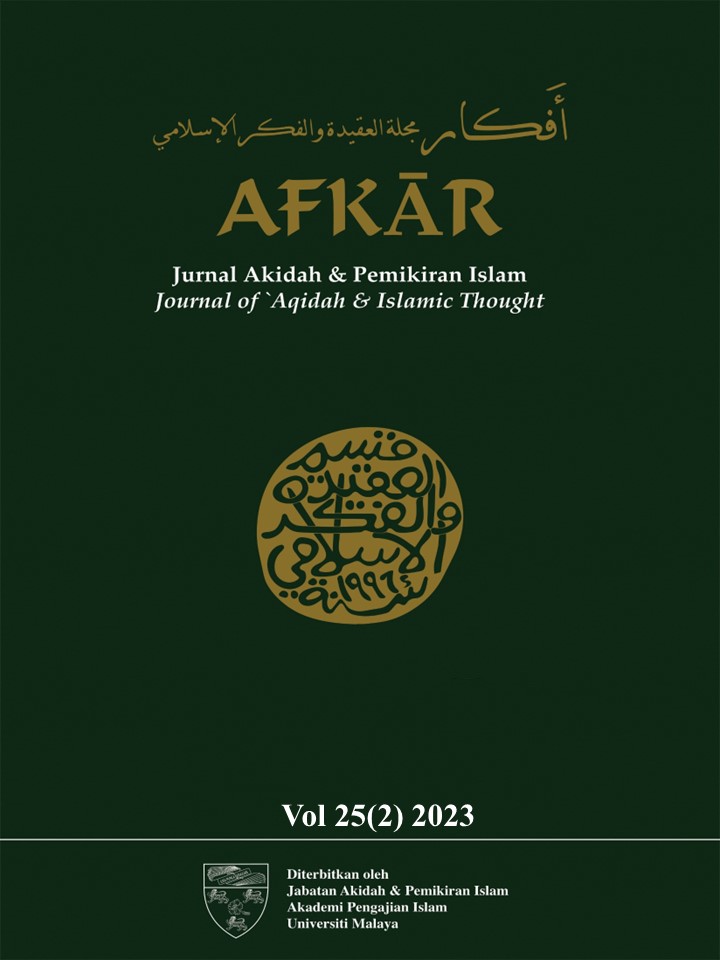Illumination of Divine Love: Rediscovering the Hikmats of Sufi Ahmad Yasawi
DOI:
https://doi.org/10.22452/afkar.vol25no2.6Keywords:
Sufi poetry, Ahmad Yasawi, Mysticism, Islam, Divine loveAbstract
Divine love, rooted in religious and spiritual traditions, remains relevant today as it represents unconditional, selfless love and fosters empathy, compassion, and understanding among individuals. Embracing the principles of divine love can promote unity, tolerance, and interdependence, fostering global harmony and peace. This study uses a philosophical framework to examine the complex concept of divine love, specifically looking at the historical development and subtle meanings of love-related terms in Islamic Sufi literature. Special attention is given to Sufi poetry, specifically the works of the renowned mystic Shaykh Ahmad Yasawi and his 12th-century collection, Devon-i Hikmat or Hikmats, which are highly respected in Turkish culture. The research explores the stages of love and offers philosophical interpretations to understand the complex implications and profound nature of this concept. This study enhances our understanding of Sufi literature’s perspective on divine love by emphasizing its enduring significance as a universal and timeless facet of human experience that transcends temporal and cultural boundaries. Consequently, it fosters a profound understanding and appreciation for the enduring themes and cultural heritage found in Turkic Sufi poetry. The research highlights the lasting significance of divine love and the cultivation of deep respect for the timeless themes and rich cultural heritage found in Turkic Sufi poetry.
Downloads
References
Abashin, Sergei. “Descendents of Saints in Modern Central Asia.” ÈTnografičEskoe Obozrenie 4(1) (2001): 62-83.
Bell, Hooks. Feminism Is for Everybody: Passionate Politics. Chicago: Pluto Press, 2000.
Bhambra, Gurminder. “Postcolonial and Decolonial Dialogs.” Postcolonial Studies 17(2) (2014): 115-121. https://doi.org/10.1080/13688790.2014.966414.
Bowden, Peter. “In Defense of Utilitarianism.” SSRN 1 (2009). https://doi.org/http://dx.doi.org/10.2139/ssrn.1534305.
Al-Bukhari, Sahih al-Bukhari, Good Manners and Form, Chapter: Allah Will Keep Good Relations with Him Who Keeps Good Relations with Kith and Kin, Hadith No. 5988, https://sunnah.com/bukhari:5988.
Chittick, William C. “Themes of Love in Islamic Mystical Theology”. In Jewish, Christian, and Islamic Mystical Perspectives on the Love of God. New York: Palgrave Macmillan, 2014: 155-180. https://doi.org/10.1057/9781137443328_8.
Chittick, William C. The Sufi Path of Love: The Spiritual Teachings of Rumi. New York: State University of New York Press, 1984.
Ford, Martin E. Motivating Humans: Goals, Emotions, and Personal Agency Beliefs. California: Sage, 1992.
Gani, Jasmine K. & Jenna Marshall. “The Impact of Colonialism on Policy and Knowledge Production in International Relations.” International Affairs 98(1) (2022): 5-22. https://doi.org/10.1093/ia/iiab226.
Gattling, Benjamin. “Historical Narrative, Intertextuality, and Cultural Continuity in Post-Soviet Tajikistan.” Journal of Folklore Research: An International Journal of Folklore and Ethnomusicology 53(1) (2016): 41-65. https://doi.org/10.2979/jfolkrese.53.1-4.41.
Hamori, Andras. “Review of Theory of Profane Love among the Arabs: The Development of the Genre.” Journal of the American Oriental Society 93(4) (1973): 568-569. https://doi.org/10.2307/600189.
Haqqul, Ibrohim. Ahmad Yasawi, 1st ed. Tashkent: Literature and Arts, 2001.
Hasan, Botirbek. Arabic-Uzbek Elementary Dictionary, Movarounnahr, https://n.ziyouz.com/kutubxona/category/30-lug-atlar.
Ibarra Cordero, Andrés. “Queer Critical Intersections with Ecology and Religion: Review of Bauman,” W. A. (Ed.) (2018). Meaningful Flesh: Reflections on Religion and Nature for a Queer Planet. Goleta, California: Punctum Books.” Descentrada 5(2) 2021: e158. https://doi.org/10.24215/25457284e158
Ibrohimov, Nematullo. Al-Qamoos: Arabic-Uzbek Encyclopedic Dictionary. Tashkent: Gafur Ghulam, 2022.
Knysh, Alexander. “Sufism as an Explanatory Paradigm: The Issue of the Motivations of Sufi Resistance Movements in Western and Russian Scholarship.” Die Welt Des Islams 42(2) (2002): 139-173. https://doi.org/https://www.jstor.org/stable/1571267.
Komilov, Najmiddin. Tasawwuf. Tashkent: Movarounnahr, 2009.
Lunde, Paul & Justin Wintle. A Dictionary of Arabic and Islamic Proverbs, 1st ed. vol. 6. Oxfordshire: Routledge, 1984 Volume 6. https://doi.org/10.4324/9780367352080
Maliki, Menal, “The 11 Levels of Love in Arabic,” Arab America, accessed February 10, 2022, https://www.arabamerica.com/the-11-levels-of-love-in-arabic/.
Mashrab, Boborahim. Mehribonim Qaydasan Where Are You My Dear, ed. Najmiddin Komilov. Tashkent: Gofur Ghulam, 1990.
Muhammad Yusuf, Muhammad Sodiq. Tasavvuf Haqida Tasavvur (Imagination about Sufism). Tashkent: Hilol, 2021.
Al-Nasaie, Sunan an-Nasa’i, “The Book of the Kind Treatment of Women,” Hadith No. 3939, https://sunnah.com/nasai/36.
Al-Nasaie, Sunan an-Nasa’i, The Book of Jihad, “Concession Allowing One who has a Mother to Stay Behind,” Hadith No. 3104, https://sunnah.com/nasai:3104.
Nizami, Ganjavi. The Story of Layla and Majnun. London: Bruno Cassirer1966.
Nurbakhsh, Javad. Sufi Symbolism: The Nurbakhsh Encyclopedia of Sufi Terminology, vol. III. n.p: Khaniqahi Nimatullahi Publications (KNP), 1998.
Nwadike, Chinedu. “Intertextuality and Spirotextuality: Rethinking Textual Interconnections.” Journal of Literature, Languages and Linguistics 47(1) (2018): 76-83.
Oğuz, Öcal. “Ahmed Yasawi: Narrated Life and Wisdom Generated in His Name.” Millî Folklor 28(112) (2016): 7-11.
Paya, Ali. “Islamic Philosophy: Past, Present and Future.” Royal Institute of Philosophy Supplements 74 (2014): 265–321. doi:10.1017/S1358246114000113.
Rice, Karen. “Dictionary of Mysticism and the Esoteric Traditions.” RQ 32(4) (1993): 564-565.
Sabir, Z., & Said, S. B. “A Fractional Order Nonlinear Model of the Love Story of Layla and Majnun.” Scientific Reports 13 (2023): 5402. https://doi.org/10.1038/s41598-023-32497-5.
Saidova, Sitora Sayfiddin qizi. “Arab Tilidan O’zlashgan Atamalarning Lug'aviy-Ma'noviy Xususiyatlari.” Oriental Renaissance: Innovative, Educational, Natural and Social Sciences 2 (Special Issue 24) (2022): 337-348. https://doi.org/10.5281/zenodo.6653681.
Satsangi, Dharna & Arun K. Sinha. “Dynamics of Love and Happiness: A Mathematical Analysis.” International Journal of Modern Education and Computer Science (IJMECS) 5 (2011): 31-37. https://doi.org/10.5815/ijmecs.2012.05.05
Singh, Ashish. “The Psychology of Love: Exploring the Gender Differences in Unmarried and Married Couples.” SSRN, 2012, https://papers.ssrn.com/sol3/papers.cfm?abstract_id=2325910
Uzbekistan Academy of Sciences, Literature and Folklore. Annotated Dictionary of the Uzbek Language. Tashkent: Institute of Uzbek Language, 2013.
Yasawi, Ahmad Sufi. Devoni Hikmat. Tashkent: Gafur Ghulam, 1992.
Yusuf, Hamza, “Buddha in the Qur’an?” In Common Ground Between Islam and Buddhism, 1st ed. Louisville: Fonts Vitae, 2010: 113-136.
Yusuf, Hamza. “Generous Tolerance in Islam and Its Effects on the Life of a Muslim.” Seasons: Semiannual Journal of Zaytuna Institute 2(2) (2005): 26-42.
Yusuf, Hamza. Purification of the Heart: Signs, Symptoms and Cures of the Spiritual Diseases of the Heart. California: Sandala, 2010.
Zamim, Maryam, & Sahari, Yousef. “A Contrastive Analysis of the Use of Love Expressions in Arabic and English.” International Journal of Science and Research (IJSR) 9(6) (2020): 332-336. https://doi.org/10.21275/SR20603075605.
Downloads
Published
How to Cite
Issue
Section
License

This work is licensed under a Creative Commons Attribution-NonCommercial 4.0 International License.









